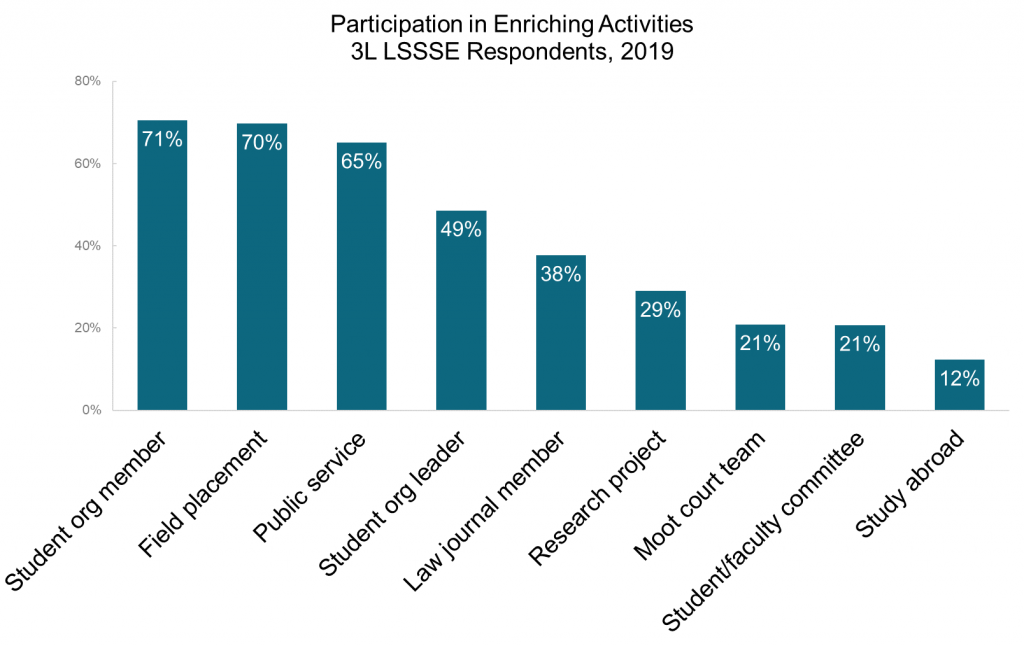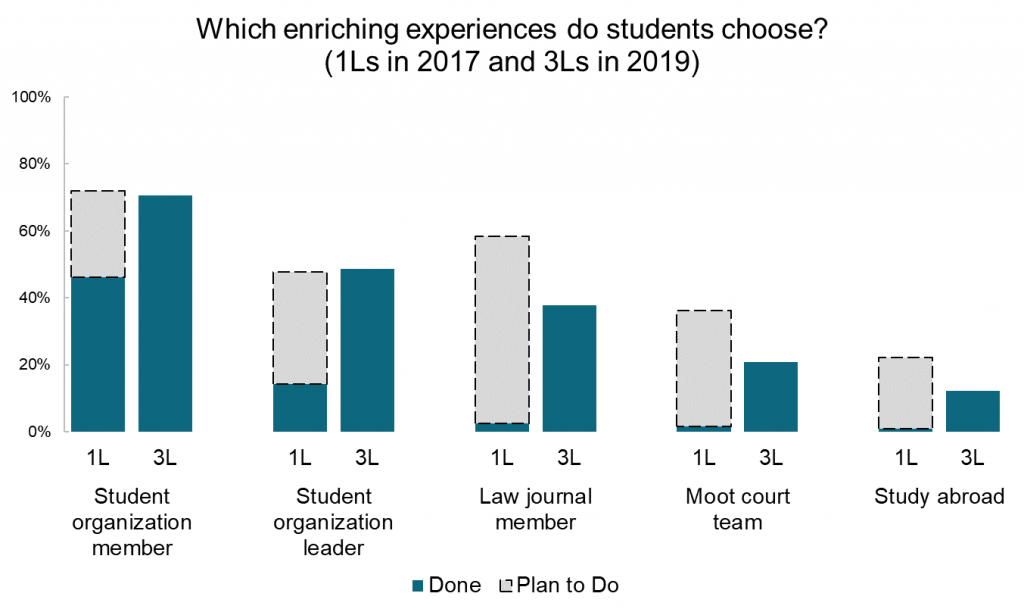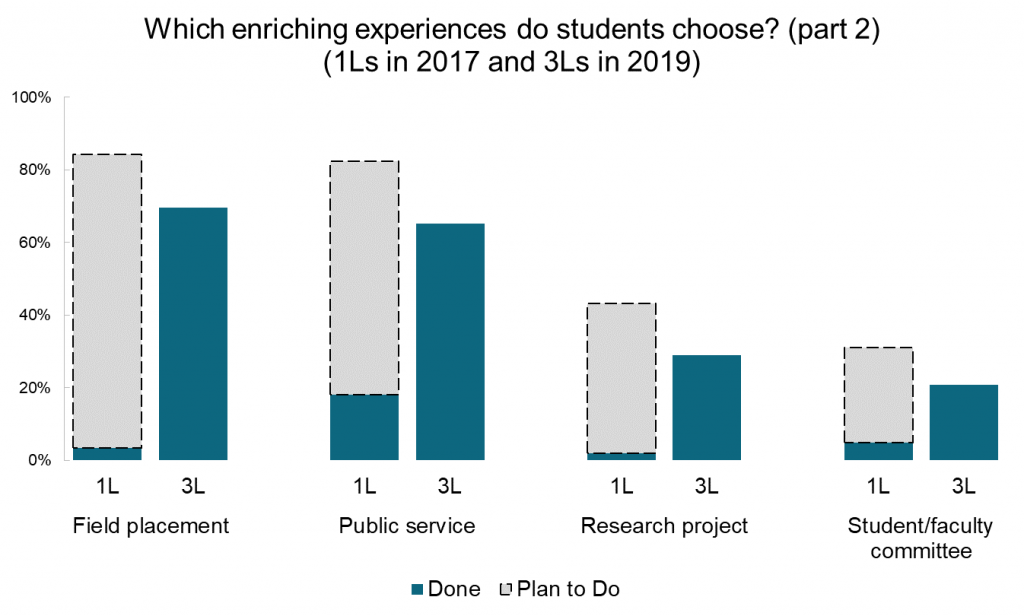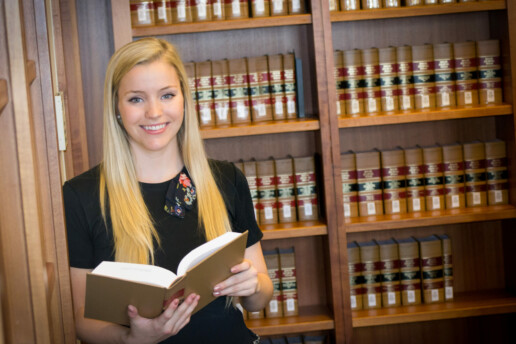Guest Post: Student Engagement and Law School Stress
 Gary R. Pike, Ph.D.
Gary R. Pike, Ph.D.
Professor, Higher Education & Student Affairs
Indiana University
The opening scenes of the 1973 movie The Paper Chase show Professor Charles Kingsfield (played by John Houseman) sternly questioning his first-year students about the fine points of case law. Professor Kingsfield’s questioning is so intense that one student becomes physically ill. Although The Paper Chase is a work of fiction, the stress of trying to be a success in law school is very real. In her Huffington Post article, Kate Mayer Mangan reported that 96% of all law students experience high levels of stress, a rate that is much higher than rates for medical school and other graduate students. According to Mangan, law school stress appears to be a product of workload and the teaching methods used in most law schools—case-diaogue instruction. Research I just conducted using data from the 2015, 2016, and 2017 LSSSE administrations showed that law school stress played an important role in what students learn.
Stress in Law School
Stress in law school was greatest for first-year students, first-generation students, women, Latinx, and Asian American students. The amount of debt incurred in law school also increased law school stress. Likewise, students’ effort in their courses increased stress, but the extent to which students felt supported in law school reduced stress.
Student Engagement, Stress, and Learning
A goal of my research was to examine the relationships among student engagement, stress, and learning during law school. I found that both the effort students put forth in their courses and the extent to which students feel supported in law school were strongly related to both academic and personal/social gains. This finding is consistent with the findings of the National Institute of Education’s Study Group on Excellence in American Higher Education report Involvement in Learning, which concluded that both setting high standards and supporting students are necessary for student success. Law school stress had a negative effect on academic learning gains, although it was not related to personal/social learning outcomes.
Gender Differences
I also found that the relationships among student engagement, stress, and learning gains differed for males and females. First and foremost, stress had a much stronger negative effect on academic outcomes for women, compared to me. This is a serious concern because women reported significantly higher levels of stress than men. On a positive note, a supportive environment in law school tended to have a stronger effect for women than men on reducing the negative effects of stress on academic gains.
Conclusion
In sum, my research shows that stress is a serious concern in law school, particularly during the first year. Stress tends to be greatest for underrepresented groups in law school—women, first-generation students, as well as several racial/ethnic minority groups. Law school deans and other administrators and faculty members who are interested in reducing stress and reducing the negative effect of stress should focus on creating supportive environments in law school, particularly for women and minoritized groups.
____
References
Mangan, K. M. (2014, October 28). Law school quadruples the chances of depression for tens of thousands: Some changes that might help. Huffington Post. Retrieved from https://www.huffingtonpost.com/kate-mayer-mangan/law-school-quadruples-dep_b_5713337.html.
National Institute of Education Study Group on the Conditions of Excellence in American Higher Education. (1984, October). Involvement in learning: Realizing the potential of American higher education. Washington, DC: U.S. Government Printing Office. ERIC Document Reproduction Service, ED246833.
Enriching Experiences: Expectations and Reality
Participation in enriching activities can help law students gain experience, learn new skills, and forge professional connections. LSSSE is a powerful tool for measuring student engagement both inside and outside the classroom. Using 2019 LSSSE data, we know that most students had joined at least one student organization (71%), completed a field placement (70%), and engaged in public service (65%) by the end of their third year. Relatively few students had competed on a moot court team (21%), served on a student/faculty committee (21%), or studied abroad (12%).

But how do 1L students’ intentions to engage in enriching experiences match their experiences? We compared the 1L student data from 2017 with 3L student data from 2019 to see whether students in this cohort had ultimately engaged in the activities that seemed most appealing early in their law school careers.
Nearly half (46%) of student had joined at least one student organization by the end of their first year, and another 26% planned to do so eventually (72% total). Indeed, by 2019, 71% of students had become a member of a student organization. The expectations and reality were similarly matched for student organization leadership, with 14% serving in a leadership position during their first year and another 34% planning to take on a leadership role eventually (48% total). In 2019, 49% of students reported having been a student organization leader. However, approximately a third of students expected to work on a law journal, but only 20% of students had been law journal members by the time they became 3Ls.

Gaining real-world legal experience was a high priority for 1L students, with 84% of 1Ls expressing interest in field placements and 82% expressing interest in public service. Most students engage in these experiences before graduation (70% and 65%, respectively). Less than half of 1L students express interest in research projects (43%) or student/faculty committees (31%), and even fewer go on to participate in these activities (29% and 21%, respectively).

As one might expect, different activities have different levels of appeal for students. But in general, 1L student seem to accurately predict where they will devote their extracurricular energy over the course of their law school careers.


